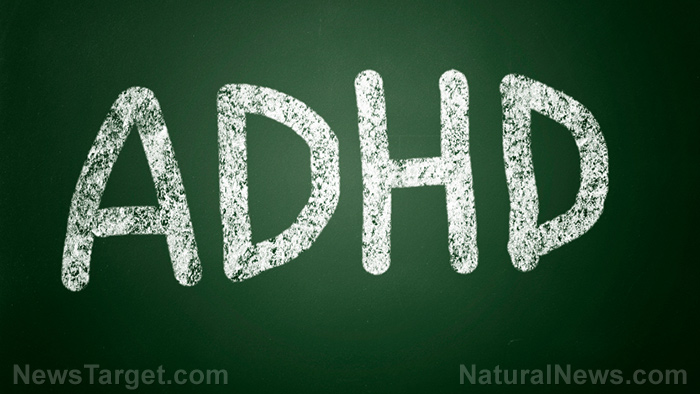A quarter of American adults think they have ADHD: Here’s how good nutrition helps manage symptoms
12/18/2024 / By Willow Tohi

- The conversation on ADHD has evolved from diagnosis to effective symptom management, emphasizing foundational health pillars like nutrition, exercise and sleep.
- A diet rich in whole foods (fruits, vegetables, lean proteins, healthy fats) supports brain health, while processed foods and sugar can worsen symptoms like inattention and hyperactivity.
- The gut microbiome influences ADHD symptoms; probiotics and prebiotic foods can restore balance and improve brain function.
- Physical activity boosts focus and reduces ADHD symptoms, while addressing root causes (e.g., nutritional deficiencies, stress, and hormonal imbalances) through functional medicine can enhance long-term well-being.
- Tailored approaches, including dietary adjustments, exercise routines, and stress management, are key to optimizing brain health and improving quality of life for individuals with ADHD.
In recent years, the conversation around Attention-Deficit/Hyperactivity Disorder (ADHD) has shifted from a focus on diagnosis to a deeper exploration of how individuals can manage their symptoms effectively. While ADHD is often thought of as a childhood disorder, it can persist into adulthood, affecting an estimated 15.5 million adults in the United States alone. The good news is that there are foundational pillars of health that can significantly impact brain function and help individuals with ADHD thrive. Among these, nutrition stands out as a critical component that can prevent disease and improve overall well-being.
Nutrition plays a pivotal role in brain health, and for individuals with ADHD, it can be a game-changer. The brain requires specific nutrients to function optimally, and deficiencies in key vitamins, minerals, and fatty acids have been linked to the symptoms of ADHD. For example, deficiencies in iron, vitamin D, omega-3 fatty acids, magnesium and zinc are common among individuals with ADHD and can exacerbate symptoms such as inattention, hyperactivity, and impulsivity.
A diet rich in whole foods, including fruits, vegetables, lean proteins and healthy fats, can provide the essential nutrients needed to support brain function. Conversely, a diet high in processed foods, sugar and unhealthy fats can contribute to inflammation and exacerbate ADHD symptoms. For instance, sugar spikes can lead to inattentiveness, fidgeting, and mood swings, which are hallmark symptoms of ADHD.
The gut-brain connection – nutrition and exercise are key
Recent research has highlighted the critical role of the gut microbiome in brain health. The gut and brain are intimately connected, and imbalances in the gut microbiome have been associated with a range of neurological conditions, including ADHD. Studies have shown that specific patterns of gut bacteria can contribute to reactive aggression and other ADHD symptoms. Nutritional interventions, such as probiotics and a diet rich in prebiotic foods like fermented vegetables and whole grains, can help restore balance to the gut microbiome and improve brain function.
In addition to nutrition, physical activity is another cornerstone of brain health. Exercise has been shown to boost energy levels, improve focus, and reduce symptoms of inattention and hyperactivity. For individuals with ADHD, movement can serve as a natural form of therapy, helping to regulate the brain’s activity and improve overall mood. Activities like running, walking, and sports that require quick responses to a changing environment can be particularly beneficial.
Addressing root causes
Sleep and stress management are also critical components of brain health. Poor sleep can exacerbate ADHD symptoms, while adequate rest helps the brain recharge and function more effectively. Stress, on the other hand, can lead to inflammation and impair cognitive function. Practices such as meditation, mindfulness, and deep breathing can help reduce stress and improve overall brain health.
While medication can be an effective treatment for ADHD, it is essential to address the root causes of the disorder. Nutritional deficiencies, hormonal imbalances, and environmental factors such as exposure to toxins can all contribute to ADHD symptoms. By addressing these underlying issues through a holistic approach, individuals with ADHD can experience significant improvements in their quality of life.
For example, a low-carbohydrate diet has been shown to improve symptoms of ADHD in children with Type 1 diabetes. Similarly, eliminating allergenic foods and adopting an anti-inflammatory diet can help reduce symptoms and improve behavior. Functional medicine approaches, which focus on identifying and addressing the root causes of health issues, can be particularly effective in managing ADHD symptoms.
Every individual with ADHD is unique, and treatment strategies should be tailored to their specific needs. Personalized approaches that consider factors such as nutrition, exercise, sleep, and stress management can help individuals with ADHD achieve optimal brain health. Tools like standing desks, exercise routines, and dietary adjustments can be customized to fit individual lifestyles and preferences.
ADHD is a complex disorder that requires a multifaceted approach to management. While medication and therapy can be effective, addressing foundational pillars of health such as nutrition, exercise, and sleep can provide long-term benefits. By focusing on good nutrition and adopting a holistic approach to brain health, individuals with ADHD can set their brains up for success and improve their overall well-being.
Prevention can be the best medicine. By nourishing our bodies with the right foods and adopting healthy lifestyle habits, we can prevent disease and support optimal brain function. For individuals with ADHD, this approach can be transformative, helping them to navigate the challenges of daily life with greater ease and confidence.
Sources include:
Submit a correction >>
Tagged Under:
adhd, alternative medicine, brain function, brain health, food cures, food is medicine, food science, health issues, health science, inflammation, mind, mind body science, natural cures, natural health, natural medicine, nutrients, nutrition, physical activity, remedies
This article may contain statements that reflect the opinion of the author
RECENT NEWS & ARTICLES
Digestion.News is a fact-based public education website published by Digestion News Features, LLC.
All content copyright © 2018 by Digestion News Features, LLC.
Contact Us with Tips or Corrections
All trademarks, registered trademarks and servicemarks mentioned on this site are the property of their respective owners.




















